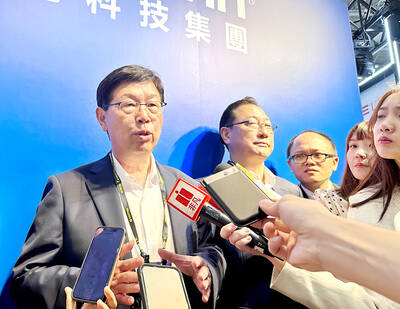The Financial Supervisory Commission (FSC) on Monday said it would finish a comprehensive examination of banks by July to see if they have been overcharging clients through default fines or interest.
The inspection comes in the wake of the commission’s discovery earlier this month that one bank made NT$10 million (US$324,517) from default fines.
Banks found overcharging clients must return the money, commission Chairman Wellington Koo (顧立雄) said, adding that the commission would report to the legislature’s Finance Committee within one month after completing the inspection.
The commission has asked the Bankers Association to address the issue by requiring all banks to conduct an audit and report the results to the commission, Examination Bureau head Wang Li-chuan (王儷娟) said.
Regulations bar banks from fining clients three times in a row, but one bank charged its clients more than four times, Wang said, adding that each fine cannot exceed NT$500.
The bank’s overcharged fines totaled about NT$10 million, she said, adding that it would be asked to return the money.
Chinese Nationalist Party (KMT) Legislator William Tseng (曾銘宗) said at a meeting of the legislature’s Finance Committee that the US regulator in June found that Citibank had overcharged its credit-card customers US$335 million in interest since 2011.
Citibank Taiwan Ltd (台灣花旗) was also fined NT$2.5 million by the commission after a system update glitch caused it to overcharge its credit-card clients, causing an estimated 300,000 clients to lose a total of NT$31 million, Tseng said, urging Koo to initiate a complete check.

Taiwan Transport and Storage Corp (TTS, 台灣通運倉儲) yesterday unveiled its first electric tractor unit — manufactured by Volvo Trucks — in a ceremony in Taipei, and said the unit would soon be used to transport cement produced by Taiwan Cement Corp (TCC, 台灣水泥). Both TTS and TCC belong to TCC International Holdings Ltd (台泥國際集團). With the electric tractor unit, the Taipei-based cement firm would become the first in Taiwan to use electric vehicles to transport construction materials. TTS chairman Koo Kung-yi (辜公怡), Volvo Trucks vice president of sales and marketing Johan Selven, TCC president Roman Cheng (程耀輝) and Taikoo Motors Group

Among the rows of vibrators, rubber torsos and leather harnesses at a Chinese sex toys exhibition in Shanghai this weekend, the beginnings of an artificial intelligence (AI)-driven shift in the industry quietly pulsed. China manufactures about 70 percent of the world’s sex toys, most of it the “hardware” on display at the fair — whether that be technicolor tentacled dildos or hyper-realistic personalized silicone dolls. Yet smart toys have been rising in popularity for some time. Many major European and US brands already offer tech-enhanced products that can enable long-distance love, monitor well-being and even bring people one step closer to

RECORD-BREAKING: TSMC’s net profit last quarter beat market expectations by expanding 8.9% and it was the best first-quarter profit in the chipmaker’s history Taiwan Semiconductor Manufacturing Co (TSMC, 台積電), which counts Nvidia Corp as a key customer, yesterday said that artificial intelligence (AI) server chip revenue is set to more than double this year from last year amid rising demand. The chipmaker expects the growth momentum to continue in the next five years with an annual compound growth rate of 50 percent, TSMC chief executive officer C.C. Wei (魏哲家) told investors yesterday. By 2028, AI chips’ contribution to revenue would climb to about 20 percent from a percentage in the low teens, Wei said. “Almost all the AI innovators are working with TSMC to address the

FUTURE PLANS: Although the electric vehicle market is getting more competitive, Hon Hai would stick to its goal of seizing a 5 percent share globally, Young Liu said Hon Hai Precision Industry Co (鴻海精密), a major iPhone assembler and supplier of artificial intelligence (AI) servers powered by Nvidia Corp’s chips, yesterday said it has introduced a rotating chief executive structure as part of the company’s efforts to cultivate future leaders and to enhance corporate governance. The 50-year-old contract electronics maker reported sizable revenue of NT$6.16 trillion (US$189.67 billion) last year. Hon Hai, also known as Foxconn Technology Group (富士康科技集團), has been under the control of one man almost since its inception. A rotating CEO system is a rarity among Taiwanese businesses. Hon Hai has given leaders of the company’s six